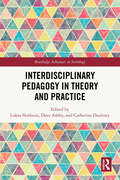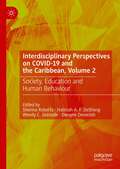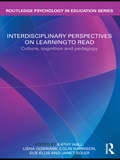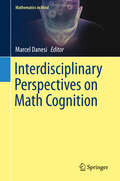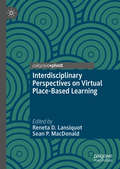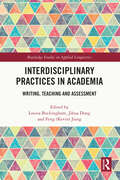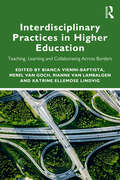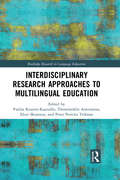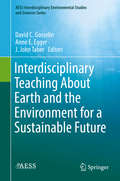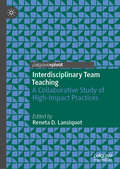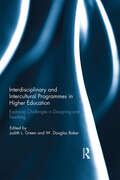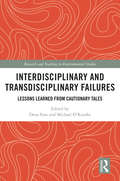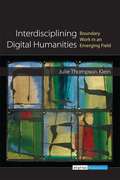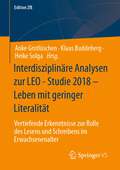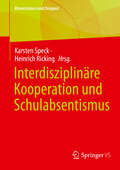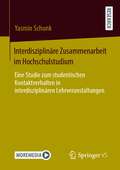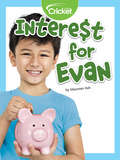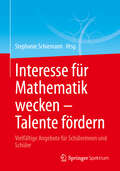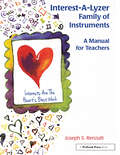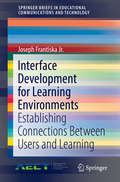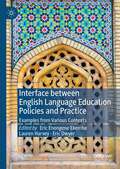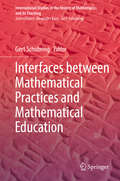- Table View
- List View
Interdisciplinary Pedagogy in Theory and Practice (Routledge Advances in Sociology)
by Catherine Duxbury Lukas Slothuus Dave AshbyThis book explores interdisciplinary university teaching in both theory and practice, drawing on the experience and expertise of educators from across the social sciences and humanities. Based around pedagogical theory and concrete practical examples and experiences from the classroom, the book contributes with a multiplicity of knowledge to the growing appetite for interdisciplinary initiatives at universities.The book is unique in offering depth and breadth of analysis of one of the most prominent experiments of interdisciplinary social science and humanities education in Britain, namely LSE100: The LSE Course, an interdisciplinary course taken by all undergraduates across disciplines at the London School of Economics and Political Science (LSE). The course has three streams, each addressing a major challenge of our time: The climate crisis, fairness, and artificial intelligence (AI).The book is of interest to academics, educators, and university leaders curious about developing and implementing interdisciplinary education in their own contexts, as well as to anyone interested in understanding the dynamics and challenges at stake in interdisciplinary educational settings. Finally, it appeals to students seeking to broaden their understanding of the social sciences beyond their own discipline.
Interdisciplinary Perspectives on COVID-19 and the Caribbean, Volume 2: Society, Education and Human Behaviour
by Sherma Roberts Halimah A. F. DeShong Wendy C. Grenade Dwayne DevonishCaribbean countries have had to navigate multiple crises, which have tested their collective resolve through time. In this regard, the region’s landscape has been shaped by an interplay of vulnerability and resilience which has brought to the fore possibilities and contradictions. It is within this context that the effects of the COVID-19 pandemic must be considered. Interdisciplinary Perspectives on COVID-19 and the Caribbean, Volume 2: Society, Education and Human Behaviour provides a comprehensive, multi- and interdisciplinary assessment of the impact of the COVID-19 pandemic, using the Caribbean as the site of enquiry. The edited collection mobilises critical perspectives brought to bear on research produced within and beyond the boundaries and boundedness of conventional academic disciplinary divides, in response to the multi-dimensional crises of our time. This volume is divided into four (4) parts consisting of twenty-three (23) chapters and weaves together four broad thematic strands: COVID-19 and Caribbean Society; COVID-19 Religion and Rights; Psycho-social Impacts of COVID-19; and Education, Innovation, and Technology. Authors working within and across the human, social, physical and life sciences consider the myriad effects of the health crisis in the region, interrogating these experiences from the granular to macro level, utilising inter and multidisciplinary lenses. Collectively, the chapters which constitute Volume II expose the fault lines in Caribbean societies, which are deeply rooted in the region’s history and delineate the precise ways in which the pandemic has transformed lives and livelihoods in the region. The culmination of this collection offers a reimagining of our Caribbean contemporary futures in the hope of finding home-grown solutions, avenues and possibilities.
Interdisciplinary Perspectives on Learning to Read: Culture, Cognition and Pedagogy
by Colin Harrison Sue Ellis Kathy Hall Usha Goswami Janet SolerInterdisciplinary Perspectives on Learning to Read brings together different disciplinary perspectives and studies on reading for all those who seek to extend and enrich the current practice, research and policy debates. The breadth of knowledge that underpins pedagogy is a central theme and the book will help educators, policy-makers and researchers understand the full range of research perspectives that must inform decisions about the development of reading in schools. The book offers invaluable insights into learners who do not achieve their full potential. The chapters have been written by key figures in education, psychology, sociology and neuroscience, and promote discussion of: comprehension gender and literacy attainment phonics and decoding digital literacy at home and school bilingual learners and reading dyslexia and special educational needs evidence based literacy visual texts. This book encompasses a comprehensive range of conceptual perspectives on reading pedagogy and offers a wealth of new insights to support innovative research directions.
Interdisciplinary Perspectives on Math Cognition (Mathematics in Mind)
by Marcel DanesiThis is an anthology of contemporary studies from various disciplinary perspectives written by some of the world's most renowned experts in each of the areas of mathematics, neuroscience, psychology, linguistics, semiotics, education, and more. Its purpose is not to add merely to the accumulation of studies, but to show that math cognition is best approached from various disciplinary angles, with the goal of broadening the general understanding of mathematical cognition through the different theoretical threads that can be woven into an overall understanding.This volume will be of interest to mathematicians, cognitive scientists, educators of mathematics, philosophers of mathematics, semioticians, psychologists, linguists, anthropologists, and all other kinds of scholars who are interested in the nature, origin, and development of mathematical cognition.
Interdisciplinary Perspectives on Virtual Place-Based Learning
by Reneta D. Lansiquot Sean P. MacDonaldThis book explores how virtual place-based learning and research has been interpreted and incorporated into learning environments both within and across disciplinary perspectives. Contributing authors highlight the ways in which they have employed a variety of methodologies to engage students in the virtual exploration of place. In the process, they focus on the approaches they have used to bring the real world closer through virtual exploration. Chapters examine how the resources of the urban environment have been tapped to design student research projects within the context of an interdisciplinary course. In this way, authors highlight how virtual place-based learning has employed the tools of mapping and data visualization, information literacy, game design, digital storytelling, and the creation of non-fiction VR documentaries. This book makes a valuable contribution to the literature, offering a model of how the study of place can be employed in creative ways to enhance interdisciplinary learning.
Interdisciplinary Practices in Academia: Writing, Teaching and Assessment (Routledge Studies in Applied Linguistics)
by Louisa Buckingham Jihua Dong Feng Kevin JiangThis volume addresses the implications that academic interdisciplinarity in the field of English for Academic Purposes (EAP) and English for Specific Purposes (ESP) has for research and pedagogy with a global reach. The Editors present a coherent, research-supported analysis of the influence of interdisciplinary research and methods on the way academics collaborate on courses, develop their careers, and teach students. The hitherto prevalence of disciplinary silo-like approaches to academic and scientific issues is increasingly ceding ground to an interdisciplinary synergy of different methodological and epistemological traditions. In the context of ongoing trends towards interdisciplinarity in degree programmes and the increasing popularity of such degree programmes with students (e.g., bioinformatics, computational linguistics, psycholinguistics, neuropolitics, evolutionary finance, global studies, and security studies), academics and programme administrators need awareness of the skills needed to operate in interdisciplinary contexts. Studies in this edited volume examine interdisciplinary communication practices, and identify how academic writing, teaching, language proficiency assessment and degree programmes are responding to changes in the broader social, institutional and political contexts of academia. As authors in the volume demonstrate, the discursive features, literacy practices and instructional modes, and the student experience of these emerging interdisciplines deserve systematic exploration. This insightful volume sheds light on contexts across the globe and will be used by students studying EAP and ESP pedagogy or practice; academics in the fields of applied linguistics and higher education, as well as higher education faculty and administrators interested in interdisciplinarity in degree programmes.
Interdisciplinary Practices in Higher Education: Teaching, Learning and Collaborating Across Borders
by Bianca Vienni-Baptista Merel Van Goch Rianne Van Lambalgen Katrine Ellemose LindvigDrawing on eight crowdsourced cases, Interdisciplinary Practices in Higher Education demonstrates the range and diversity in approaches to teaching, learning and collaborating across disciplinary and institutional borders. The cases explore everyday challenges within interdisciplinary higher education experiences such as designing study programmes, planning curricula, ensuring sufficient assessment and feedback for diverse groups of students and coordinating and aligning expectations with external stakeholders. Each case is analysed by three leading experts, providing solutions and practical guidance to support practice.Chapters explore the challenges of: Breadth versus depth in interdisciplinary teaching and learning activities Disciplinary identities in interdisciplinary collaborations The governance and administration of interdisciplinary courses and study programmes Career trajectories for interdisciplinary researchers Aligning expectations with stakeholders in transdisciplinary endeavours A highly practical, solution-based book, this is an essential read for lecturers, students, researchers and others who might wish to embark on an interdisciplinary path or develop future border-crossing practices within their higher education institutions.
Interdisciplinary Research Approaches to Multilingual Education (Routledge Research in Language Education)
by Peter Pericles Trifonas Themistoklis Aravossitas Vasilia Kourtis-Kazoullis Eleni SkourtouRecently intensified global mobility has reinforced the interest for ethnolinguistic diversity and multilingualism in education and society. Interdisciplinary Research Approaches to Multilingual Education brings together current interdisciplinary perspectives in multilingual and second language education to examine research and language teaching in specific countries, as well as different aspects of multilingual education that include language policies and ICT applications. Containing context-specific practical interventions and relevant theoretical approaches, it considers the contemporary challenges of language policies and practices to inform teacher and curriculum development based on international empirical research. The chapters of this book are centered around the following themes: Educational programs and policies Teaching and learning Linguistic diversity ICT and language learning This book will be of great interest to academics, researchers and postgraduate students in language education, bilingual education, second/foreign language learning, CALL, and applied linguistics. It will also appeal to educational administrators and those involved with language education policies.
Interdisciplinary Teaching About Earth and the Environment for a Sustainable Future (AESS Interdisciplinary Environmental Studies and Sciences Series)
by David C. Gosselin Anne E. Egger J. John TaberInterdisciplinary Teaching about the Earth and Environment for a Sustainable Future presents the outcomes of the InTeGrate project, a community effort funded by the National Science Foundation to improve Earth literacy and build a workforce prepared to tackle environmental and resource issues. The InTeGrate community is built around the shared goal of supporting interdisciplinary learning about Earth across the undergraduate curriculum, focusing on the grand challenges facing society and the important role that the geosciences play in addressing these grand challenges. The chapters in this book explicitly illustrate the intimate relationship between geoscience and sustainability that is often opaque to students. The authors of these chapters are faculty members, administrators, program directors, and researchers from institutions across the country who have collectively envisioned, implemented, and evaluated effective change in their classrooms, programs, institutions, and beyond. This book provides guidance to anyone interested in implementing change—on scales ranging from a single course to an entire program—by infusing sustainability across the curriculum, broadening access to Earth and environmental sciences, and assessing the impacts of those changes.
Interdisciplinary Team Teaching: A Collaborative Study of High-Impact Practices
by Reneta D. LansiquotThis book explores the community of practice at New York City College of Technology engaged in interdisciplinary team teaching. Professors report on their high-impact practices when they combine the assets of different disciplines. Chapters feature examples of the innovative curriculum resulting from a true interdisciplinary system, including place-based learning. The book also discusses questions of validity and measuring the influence of high-impact practice within interdisciplinary co-teaching.
Interdisciplinary Thinking for Schools: Ethical Dilemmas MYP 1, 2 & 3
by Dr. Meredith Harbord Meredith J Harbord Sara Riaz KhanInterdisciplinary Thinking for Schools: Ethical Dilemmas MYP 1, 2 & 3 is not your average textbook resource. Innovative ethical design projects illustrated with spectacular artwork will connect students to exciting and purposeful learning. Rich primary research includes interviews with the following visionaries: Alberto Alessi, Astronomer Royal Martin Rees, Dr. Jane Goodall, Jared Della Valle and the Stephanie Alexander Kitchen Garden Foundation. The interdisciplinary units have been written with a focus on creativity, critical thinking and exploration of embedded ethical dilemmas. Our strategies support the growth of an innovative and student-centered curriculum to generate real world, sustainable solutions to problems in keeping with the IB MYP philosophy.
Interdisciplinary Thinking for Schools: Ethical Dilemmas MYP 1, 2 & 3
by Meredith J Harbord Sara Riaz KhanInterdisciplinary Thinking for Schools: Ethical Dilemmas MYP 1, 2 & 3 is not your average textbook resource. Innovative ethical design projects illustrated with spectacular artwork will connect students to exciting and purposeful learning. Rich primary research includes interviews with the following visionaries: Alberto Alessi, Astronomer Royal Martin Rees, Dr. Jane Goodall, Jared Della Valle and the Stephanie Alexander Kitchen Garden Foundation. The interdisciplinary units have been written with a focus on creativity, critical thinking and exploration of embedded ethical dilemmas. Our strategies support the growth of an innovative and student-centered curriculum to generate real world, sustainable solutions to problems in keeping with the IB MYP philosophy.
Interdisciplinary Thinking for Schools: Ethical Dilemmas MYP 4 & 5
by Meredith J Harbord Sara Riaz Khan Dr Meredith HarbordInterdisciplinary Thinking for Schools: Ethical Dilemmas MYP 4 & 5 continues on from Interdisciplinary Thinking for Schools: Ethical Dilemmas MYP 1, 2 & 3 and like the first book it is not your average textbook resource.Innovative ethical design projects illustrated with spectacular artwork will connect students to exciting and purposeful learning.Rich primary research includes interviews with the following visionaries: Alberto Alessi, Astronomer Royal Martin Rees, Dr. Jane Goodall, Jared Della Valle and the Stephanie Alexander Kitchen Garden Foundation. The interdisciplinary units have been written with a focus on creativity, critical thinking and exploration of embedded ethical dilemmas. Our strategies support the growth of an innovative and student-centered curriculum to generate real world, sustainable solutions to problems in keeping with the IB MYP philosophy.The authors Dr. Meredith J Harbord and Sara Riaz Khan, are two experienced MYP design teachers whose approach advocates respect for oneself, the community and the world.
Interdisciplinary and Intercultural Programmes in Higher Education: Exploring Challenges in Designing and Teaching
by Judith L. Green W. Douglas BakerAt the centre of this book is the exploration of how logic-in-use both leads to a particular understanding of the phenomena of interest (such as opportunities for learning specific processes) and shapes a particular view of what evidence counts in constructing claims. The contributions brought together here invite readers to explore the processes involved in developing and studying educational innovations, and to undercover the interdependent conceptual and epistemological actions, processes and practices of instructors, programme developers and students.Taken together, the book brings forward an argument related to the reflexive turn – the understanding that researchers in the social sciences construct, rather than find, phenomena of interest. Therefore, this book creates the potential to examine not only the logic-in-use developed by different researchers, but also to examine the complex nature of particular phenomena of interest to the researcher themselves. This book was originally published as a special issue of Pedagogies: An Educational Journal.
Interdisciplinary and Transdisciplinary Failures: Lessons Learned from Cautionary Tales (Research and Teaching in Environmental Studies)
by Dena Fam and Michael O’RourkeUnlike other volumes in the current literature, this book provides insight for interdisciplinary and transdisciplinary researchers and practitioners on what doesn’t work. Documenting detailed case studies of project failure matters, not only as an illustration of experienced challenges but also as projects do not always follow step-by-step protocols of preconceived and theorised processes. Bookended by a framing introduction by the editors and a conclusion written by Julie Thompson Klein, each chapter ends with a reflexive section that synthesizes lessons learned and key take-away points for the reader. Drawing on a wide range of international case studies and with a strong environmental thread throughout, the book reveals a range of failure scenarios for interdisciplinary and transdisciplinary projects, including: • Projects that did not get off the ground; • Projects that did not have the correct personnel for specified objectives; • Projects that did not reach their original objectives but met other objectives; • Projects that failed to anticipate important differences among collaborators. Illustrating causal links in real life projects, this volume will be of significant relevance to scholars and practitioners looking to overcome the challenges of conducting interdisciplinary and transdisciplinary research.
Interdisciplining Digital Humanities: Boundary Work In An Emerging Field
by Julie Thompson KleinInterdisciplining Digital Humanities sorts through definitions and patterns of practice over roughly sixty-five years of work, providing an overview for specialists and a general audience alike. It is the only book that tests the widespread claim that Digital Humanities is interdisciplinary. By examining the boundary work of constructing, expanding, and sustaining a new field, it depicts both the ways this new field is being situated within individual domains and dynamic cross-fertilizations that are fostering new relationships across academic boundaries. It also accounts for digital reinvigorations of "public humanities" in cultural heritage institutions of museums, archives, libraries, and community forums.
Interdisziplinäre Analysen zur LEO - Studie 2018 – Leben mit geringer Literalität: Vertiefende Erkenntnisse zur Rolle des Lesens und Schreibens im Erwachsenenalter (Edition ZfE #14)
by Anke Grotlüschen Heike Solga Klaus BuddebergDie 2020 veröffentlichten ersten Befunde der aktuellen LEO-Studie beleuchten nur einige Aspekte und waren häufig deskriptiver Natur. Large-Scale-Assessments wie die LEO-Studie enthalten jedoch entschieden mehr Analysemöglichkeiten – sowohl hinsichtlich der inhaltlichen Breite als auch der statistischen Modellierung. Daher versammelt dieser Band Analysen zu unterschiedlichen Aspekten der Zusammenhänge zwischen Literalität(en) und Teilhabechancen in interdisziplinärer Perspektive. Die Beiträge des Bandes folgen dem gegenwärtigen Grundbildungsdiskurs in Deutschland, der sich aus einer reinen Betrachtung der Lese- und Schreibkompetenz befreit und bildungsrelevante Bezüge zu diversen Lebensbereichen mit einbezieht. Dazu zählen Arbeit und Familie, Digitalisierung, Finanzen, Gesundheit, Politik und Migration sowie Mehrsprachigkeit.
Interdisziplinäre Kooperation und Schulabsentismus (Absentismus und Dropout)
by Heinrich Ricking Karsten SpeckBislang fehlt es an fundierten Forschungsbefunden zum Thema Multiprofessionelle Kooperation und Schulabsentismus im deutschsprachigen Raum. Im Zuge des Ausbaus von Ganztagsschulangeboten, Kooperationsangeboten zwischen Jugendhilfe und Schulen, inklusiven Bildungsangeboten von schulischen Beratungs- und Unterstützungssystemen gewinnt darüber hinaus die Kooperation unterschiedlicher Berufskulturen und Institutionen beim Thema Schulabsentismus an Bedeutung. Hier setzt das Konzept für die Buchpublikation „Multiprofessionelle Kooperation und Schulabsentismus“ an. Es zeigt sowohl die Probleme wie auch die Gelingensbedingungen auf und macht deutlich, dass gute Zusammenarbeit über Fächergrenzen hinweg möglich ist.
Interdisziplinäre Zusammenarbeit im Hochschulstudium: Eine Studie zum studentischen Kontaktverhalten in interdisziplinären Lehrveranstaltungen
by Yasmin SchunkInterdisziplinäre Lehr-/Lernformate finden in den letzten Jahren zunehmend Eingang in die akademische Hochschulbildung. An diese wird mitunter das Ziel geknüpft, Studierende auf eine fachübergreifende Zusammenarbeit im Berufsleben vorzubereiten. Dieses Buchpräsentiert erstmals eine empirisch begründete Theorie zur studentischen Interaktion in fachlich gemischten Gruppen. Mit Fokus auf das sozialpsychologische Geschehen analysiert die Autorin verschiedene Hindernisse für die interdisziplinäre Zusammenarbeit und liefert gleichzeitig Ansatzpunkte zur Förderung positiver Kontaktbeziehungen sowie zur Moderation intergruppaler Konflikte.
Intere$t for Evan
by Maureen AshEvan and his mother visit the bank to learn about savings accounts.
Interesse für Mathematik wecken – Talente fördern: Vielfältige Angebote für Schülerinnen und Schüler
by Stephanie SchiemannIn dem vorliegenden Buch trägt die Herausgeberin ihre vielfältigen Erfahrungen und Kontakte bzgl. der mathematischen Fördermöglichkeiten für Schülerinnen und Schüler innerhalb und außerhalb des Schulunterrichts zusammen. Zahlreiche aktiv Verantwortliche stellen ein breites Spektrum an mathematischen Angeboten, Förderprojekten und Mathematik-Wettbewerben vor. Zudem kommen ehemalige Teilnehmende sowie mathematische Koryphäen zu Wort. Sie beantworten Fragen der Herausgeberin zu ihrem persönlichen, mathematischen Werdegang: ihrer Förderung, Ausbildung und ihrem jetzigen Wirkungsfeld. Pädagogische und psychologische Aspekte umrahmen die Erfahrungen.
Interest-A-Lyzer Family of Instruments
by Joseph RenzulliMotivate your students by offering instructional experiences within their interest areas! Based on the idea that children learn best when they are interested in the topic, the six interest assessment tools that comprise the Interest-A-Lyzer Family of Instruments help educators identify each student's unique interests. In this manual, Dr. Joseph Renzulli discusses the importance of assessing student interests and provides suggestions for administering and interpreting these instruments in the school setting. Sample pages from each interest assessment tool are included in the appendix. Class sets of 30 instruments are sold separately.
Interface Development for Learning Environments: Establishing Connections Between Users and Learning (SpringerBriefs in Educational Communications and Technology)
by Joseph Frantiska Jr.This brief will examine and explore some tools and techniques that can be used to develop interfaces for learning environments. Interface design has been a topic in software engineering for many years. The advent of graphical user interfaces has created many remedies and challenges for the software engineer. In recent years with an increased emphasis in educational technology, instructional designers are also included in this arena. The interface can be a driver in terms of a learning environment’s ability to engage a student. It can also provide a point of information exchange and therefore learning between the student and the environment’s software. Thus, the issue of an interface is vital to the success of a learning environment. This brief will produce a variety of interfaces for various environments to allow the designer to contrast and compare them based upon the required purpose. The designer will have a toolkit filled with tools and techniques which will allow for interfaces that will engage the student and facilitate their learning. The primary audiences are K-12 and post-secondary educators who desire to create digital media based educational materials.
Interface between English Language Education Policies and Practice: Examples from Various Contexts
by Eric Enongene Ekembe Lauren Harvey Eric DwyerThis book is about the policy-practice praxis in English language education, and draws on research from a diverse range of under-explored international settings to showcase the importance of contextual realities on how policy and practice interact. The case studies covered in the volume come from five continents (Africa, Europe, Asia, and South and North America) and cover 11 countries in total. The authors cover a wide range of themes and identify a number of issues at the interface between policy and practice. In some cases they also highlight local initiatives for navigating these issues, providing contextually-grounded guidance and experience which will be of use to teachers and teacher trainers in other settings. This book will be of interest to policy makers, EMI researchers, ELT practitioners, teacher trainers and trainees, and the broader Applied Linguistics research community.
Interfaces between Mathematical Practices and Mathematical Education (International Studies in the History of Mathematics and its Teaching)
by Gert SchubringThis contributed volume investigates the active role of the different contexts of mathematics teaching on the evolution of the practices of mathematical concepts, with particular focus on their foundations. The book aims to deconstruct the strong and generally wide-held conviction that research in mathematics constitutes the only driving force for any progress in the development of mathematics as a field. In compelling and convincing contrast, these chapters aim to show the productive function of teaching, showcasing investigations from countries and regions throughout various eras, from Old Babylonia through the 20th Century. In so doing, they provide a critical reflection on the foundations of mathematics, as well as instigate new research questions, and explore the interfaces between teaching and research.
